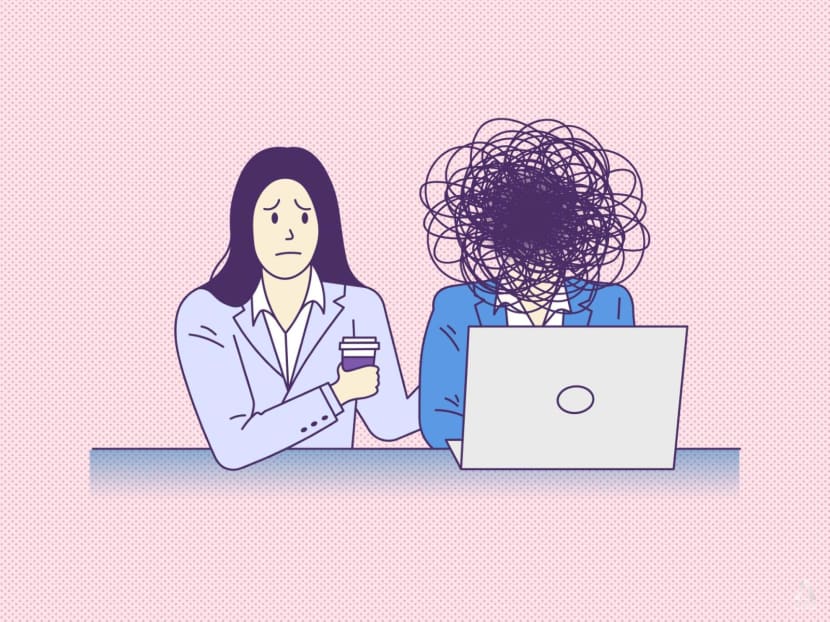Tell-tale signs a friend or colleague is facing emotional upheaval, and how to help them press on
Counselling experts outlined key signs that may indicate a person is facing emotionally tough times. There are also right ways and wrong ways to support the person in carrying on with work or life in general, they added.

Simply being present while showing empathy and compassion to someone who is going through emotional pain can go a long way, counsellors said. (Illustration: CNA/Nurjannah Suhaimi)

This audio is generated by an AI tool.
When a close friend’s younger brother died in December 2023, I found myself in an unfamiliar emotional space.
Though I did not have a personal relationship with her brother, helping to support a loved one through her grief was deeply affecting.
I remember helping out at the wake service one evening and crying alongside my friend and our mutual friends.
In the midst of all that emotional turmoil, I had to head to work the next day and try to perform as if everything was normal.
I did not want to “drop the ball” at work, because this meant that a colleague would have had to double up and take on part of my responsibilities.
At the same time, the situation was difficult to talk about because it was not a loss I had experienced directly. I did not know how to broach the topic with my bosses or colleagues.
This dilemma led me to try to compartmentalise – suppressing how I felt emotionally and forcing myself to try to keep it at the back of my mind so that I could continue producing news content when I returned to work.
This experience left me wondering whether this approach to juggling my emotional upheaval and my work obligations was the right way to go, so I talked to various experts to get their take.
I also wanted to know how we can recognise the signs that colleagues or friends might be facing a rough time emotionally if, as in my situation, it is not easy to talk about such matters.
And also, of course, what we can do to help them “show up” if they are struggling.
This need for life to go on, even as we face emotional turmoil, is familiar to many of us at various points in life, the experts told me.
We could have faced emotional distress from journeying with a loved one through chronic illness, gone through a relationship break-up or lost a pet.
Transitions such as the end of a relationship, empty-nest syndrome or a career change have the potential to bring on anxiety, confusion and apprehension about the future, which can throw us into emotional turmoil, the experts said.
Yet, while we might not be feeling our best, there are other aspects of our lives that we have to continue showing up for – whether as a parent, a daughter, a friend or a colleague.
Ms Wendy Morton, a counsellor and psychotherapist at Counseling Perspective, said that in reality, grief over significant life upheaval does not happen in a vacuum.
So was my approach the right way to go?Ms Priscilla Shin, principal psychotherapist at Range Counselling Services, said that in the short term, this allows a person to temporarily set aside their emotions to focus on fulfilling immediate tasks or responsibilities.
Ms Ooi Sze Jin, clinical psychologist and founder of A Kind Place, said that to some extent, this approach helps us to keep to an established daily schedule or routine, which can be helpful in maintaining a sense of normalcy while dealing with emotional challenges.
Although compartmentalisation might offer temporary respite, the practice is not ideal in the long run, the experts told CNA TODAY.
An overt reliance on compartmentalising could be detrimental if it leads to emotional avoidance in the long term, where feelings are ultimately suppressed and not processed.
And if our feelings of immense emotional distress are continually ignored or left unaddressed, this could eventually resurface in other ways over time, the experts said.
HOW TO TELL IF SOMEONE IS DOWN EMOTIONALLY
To go back to my situation, the experts acknowledged that it can be hard to talk about how one is going through periods of emotional turmoil.
Those around us may be less able to spot that we are going through a tough time, as with the case of my “disenfranchised grief” where the loss wasn’t someone personally close to me.
This can mean suffering in silence, they added.
Ms Lily Ching, a professional counsellor at online and face-to-face therapy platform Talk Your Heart Out, said that such disenfranchised grief – not recognised or acknowledged by others – could thus feel worse than grief that others around us can identify with and easily validate.
Not having one’s emotional distress acknowledged or validated can compound the impact of loss, isolation, rejection and a sense of not being understood.
If it is difficult for those around us such as a loved one or close colleague to express what they are going through, are there tell-tale signs we can look out for that someone is going through emotional turmoil?
The experts said that some indications to look out for include changes in a person’s physical appearance, behaviour and emotional signs such as mood fluctuations.
Physical signs could include fatigue, exhaustion, changes in appetite or a neglect of personal hygiene.
We may also notice a colleague struggling with concentration, making careless mistakes or appearing overwhelmed by tasks they usually manage easily, Ms Shin of Range Counselling Services said.
Changes in behaviour may include a noticeable withdrawal from social interactions or decreased participation in activities once enjoyed.
One may also display non-verbal cues such as having tense body language, fidgeting, avoiding talking about certain topics or becoming emotional when addressing specific subjects, Ms Shin added.
These could be accompanied by emotional signs such as mood swings and increased irritability.
And if we do notice these signs in those around us, even if they have not explicitly confided in us about their emotional turmoil, it may be helpful to broach the topic, albeit in a sensitive and empathetic manner, the experts advised.
One way to do so is by gently expressing concern and sharing our observations in a non-judgemental way, Ms Shin said.
Invite the person to share without feeling pressured, by saying, for example: “I’ve noticed you’ve seemed a bit quieter lately and I just wanted to check in – how are you doing?”
Using open-ended questions may also give those around us space to share. And in the event that they do open up, it could be helpful to focus on listening rather than problem-solving, Ms Shin added.
HOW TO SUPPORT SOMEONE WHO IS IN EMOTIONAL PAIN
If we do find out that a friend or colleague is facing emotional turmoil, what should we do?
As a first step, being “present” while showing empathy and compassion can go a long way, the experts said.
Some practical ways to do this include making regular check-ins with the person, offering a non-judgemental listening ear and validating their feelings, Ms Morton said.
“Acknowledge their emotions and let them know it’s okay to feel what they’re feeling, without trying to ‘fix’ the situation,” she added.
Offering practical help may also go some way towards taking the burden off a friend or colleague in one area of their lives, to allow them to “show up” more fully in other aspects.
While we cannot replace their positions as a parent to their child at home, for example, we can assist with simple daily tasks and running errands such as grocery shopping for them, preparing meals or helping to walk their dog.
And while everyone processes emotions over different time spans, Ms Morton said that it could be problematic if people find themselves compartmentalising continually for weeks or months without addressing the underlying issues.
In such instances, and especially if they are starting to struggle with normal daily functioning, it would definitely be time for an observer to step in and offer help, she added.
For example, you may do so by sharing your own experience and how you overcame it, which may encourage those around us to normalise what they are going through and to open up about their own feelings.
“Respect their boundaries. Let them move at their own pace and give a helping nudge in the right direction, but don’t push them to do what they don’t feel comfortable doing (or sharing),” Ms Morton added.
The wrong approach? Offering unsolicited advice or comparing your experience to others. Ms Rachel Cheng, a professional counsellor at Talk Your Heart Out, said that this can be invalidating.
Agreeing, Ms Ching her colleague said: “Avoid unhelpful comments such as, ‘Time will heal’, ‘Never mind, you can get another pet’, or ‘It’s okay, move on’.”
And if the person you are supporting appears to be dealing with deep emotional distress that you feel incapable of handling, perhaps point them to professional help or even accompany them to see a therapist if necessary.
Workplaces might do well to incorporate more flexible practices to better accommodate employees facing emotional challenges, by expanding their support systems and adopting more flexible human resource practices, Ms Shin said.
“One approach is offering flexible leave for emotional distress, which would allow employees to take time off without the need to justify their absence with a specific reason like the death of a loved one. This could include mental health days or personal days to help employees recharge,” she added.
And as individuals who are supporting others, we need to also know our personal capacities and limits.
Ms Ching of Talk Your Heart Out said: “We have to be cautious and not try to be the saviour.
“We have to assess our own capacity and know if we truly have the bandwidth to support the other person. Pointing the person to professional help, for example, is already showing support to the person.”
Ultimately, grief and emotional distress are natural human responses to loss, the experts said, adding that it is important to respect the different paces at which people process their emotions.
Ms Ching said: “Attempts to cut short the grieving process, either by burying it under other distractions like work and responsibilities and not addressing the pain of losing something dear to us, or even compartmentalising grief in our lives, will inevitably affect our mental well-being, our relationship and interaction with others, and in short, our whole life, in the end.
“Allowing oneself to grieve is the beginning of healing.”















